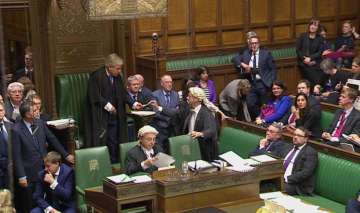UK Parliament votes in favour of Brexit process, govt rolls out white paper
The procedure of Britain leaving the European Union has moved one step closer after having cleared a noteworthy obstacle with members from the British Parliament voting for permitting the administration to start Brexit negotiations. Members

The procedure of Britain leaving the European Union has moved one step closer after having cleared a noteworthy obstacle with members from the British Parliament voting for permitting the administration to start Brexit negotiations.
Members of the House of Commons voted yesterday by 498 to 114 to advance the bill that would give Prime Minister Theresa May the authority to invoke Article 50 of the Lisbon Treaty -- the formal process of leaving the EU.
The bill now faces further scrutiny in the Commons and the House of Lords before it can become law.
The UK government today published a White Paper on its negotiating plans for an exit from the European Union.
David Davis, minister for exiting the European Union, told the House of Commons that the government will publish another White Paper before the Great Repeal Bill, which will formally mark Britain's intention to break from the laws governing the 28-member economic bloc after the June 2016 referendum in favour of Brexit.
"We approach the negotiation to come in a spirit of good will and working to an outcome in our mutual benefit," Davis told Parliament, adding that Britian's "best days are yet to come".
"I will not be throwing people out of Britain," he added, in reference to a question about the rights of European Union citizens based in the UK following Brexit.
The White Paper spells out in detail May's 12 negotiating objectives for Brexit unveiled in a speech last month.
It confirms that the final Brexit deal will be presented before Parliament for ratification and that the UK would pursue a fresh tariff-free trade agreement with the EU after an exit from the common single market.
MPs will discuss the bill in more detail next week when it reaches the committee stage in the Commons, and Labour has vowed to force through amendments.
In response to a query by Conservative MP Maria Miller, May told the House of Commons earlier: "I can inform my Right Hon Friend and the House that that White Paper will be published tomorrow (Thursday)".
Under pressure from the Opposition and some of her own rebel MPs, the British PM had announced last week that she would be publishing a White Paper on the negotiating plans for Britain's exit from the EU in due course.
“The White Paper will reflect the plan already set out by the Prime Minister in her Brexit speech," a Downing Street spokesperson told reporters at a briefing on Wednesday morning.
The confirmation of a date for the White Paper came as MPs continued a second day of debate on the so-called Brexit Bill, which will give May the authority to invoke Article 50 and trigger the official Brexit negotiations with the EU.
"History has been made," British Foreign Minister Boris Johnson tweeted after the voting.
The government was expected to win despite the Liberal Democrats and Scottish National Party voting against it. Labour leader Jeremy Corbyn had issued a three-line whip, a strong disciplinary order, to his MPs to back the bill.
However, many Labour MPs had already indicated they would defy that whip, including Indian-origin MP Virendra Sharma.
Labour rebels joined MPs from the SNP, Liberal Democrat party, the SDLP, Green MP Caroline Lucas and Tory MP Ken Clarke in an attempt to stop May invoking Article 50 and starting the process of leaving the EU.
A total of 90 MPs are likely to oppose the bill, not enough to stop Theresa May moving a step closer to be able to work towards her declared timeline of wanting to invoke Article 50 by the end of March.
David Davis, minister for exiting the European Union, had opened the debate in the House of Commons with a clear message to MPs that they must implement a decision made by the people in the June 2016 referendum - with 51.9 per cent wanting to leave the EU and 48.1 per cent wanting to remain within the 28-nation economic bloc.
(With inputs from PTI)